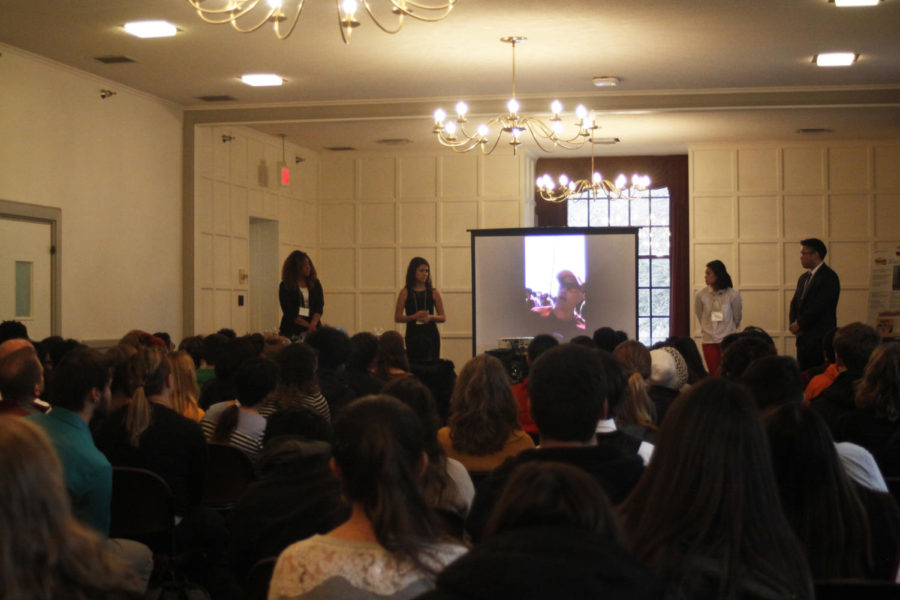ISCORE pre-conference discusses faculty impact
Kennedy DeRaedt/Iowa State Daily
Brian Le, Jocelyn Jackson, Olivia Carrasco and Limay Vong talk during the “Anyone know where I can cash in my white privilege points? Do I need a card? I keep hearing I have this, but I’m not sure where to go or how to use it.” session at ISCORE. The session was held in the Cardinal Room on March 4, 2016.
March 1, 2017
At the Iowa State Conference on Race and Ethnicity (ISCORE) pre-conference on Wednesday afternoon, professionals were able to learn from keynote speaker Daniel Spikes and others on how to deliver a more full education to students.
“We experience the world the way we are – not necessarily the way it is,” Spikes said.
The pre-conference is designed for faculty, staff and other professionals such as graduate students. It acts as a professional development opportunity, providing tools to create inclusive interactions and spaces on campus. It also kicks off ISCORE, where students will present what they have learned from the National Conference on Race and Ethnicity.
“Each faculty has their own stage, and their own platform, to teach their curriculum,” Japannah Kellogg, director of the ISCORE project, said. “[The pre-conference allows] a different space to have these conversations.”
Faculty and staff who attended the pre-conference got to go to a number of sessions, ranging in topic from the intersectionality of our identities to the language and concepts one must understand in order to make the world more racially just.
“We’re here to educate our students on a number of different levels,” Kellogg said. “You come to Iowa State to have a full education. It may not just be to become the best engineer. It hopefully is to be a better person, and you’re a better person when you do have an understanding and an appreciation for human difference.”
Spikes enforced that these conversations must take place on campus, because research “suggests that our institutions are primary socializing forces in society.”
Each person is socialized from the time that they are young, and from that socialization, implicit biases can be formed.
Spikes had been attempting to dodge those implicit biases since childhood.
“I tried to do everything that I [could] to […] downplay any negative stereotypes associated with my blackness,” Spikes said.
He didn’t tell people that he played guitar because he didn’t want them to assume what kind of music he played; he wore glasses in the hopes that people wouldn’t believe him to be stupid.
Spikes began doing this after an incident when he was walking home from school on a rainy day. A truck revved up and hit a puddle to splash him as the individuals inside yelled “n—–!”
Spikes began looking toward his white friends: what they did, what they wore, how they spoke. And he practiced the art of “code-switching,” a term that describes purposefully shifting cultural traits and vernacular to suit different circumstances.
Spikes drew upon his experience, and his identity, in order to discuss diversity regarding institutions and higher education.
“I have to be very cognizant [of my identity] to ensure that whenever I am thinking about these things, or teaching about these things, I understand that people experience the world differently because of their social identity,” Spikes said.
When Spikes was an assistant principal in a high school, a student would come to him and say that he had been accused of hitting a teacher after a fight with the teacher’s son. The fight was over a girl; when the student came into Spikes’ office, he would admit the fight with the teacher’s son. But he refused to say that he hit the teacher.
He said he thought she had said that he hit her because he was black, as she never had approved of her son and his friendship, nor was her son allowed to go to his house, among other things.
In this moment, Spikes doubted the student, as he had known the teacher and she had never been disparaging toward him. When Spikes doubted the student, he shattered the trust he had with him and invalidated his experience.
The student later dropped out.
Racism, Spikes said, is often looked at as isolated events. He compared it, rather, to smog in the air.
“We all breathe it in, so therefore we all breathe it out, which means we are all complicit unless we are anti,” Spikes said, “actively fighting against it.”
Kellogg encouraged that inclusivity makes us a better community.
“In order for us to really make change, the process has to begin with us [as educators,]” Spikes said.
The ISCORE conference on Friday will be hosted by students and open to all, delivering the experience they had at the national conference to all of the Iowa State campus.







